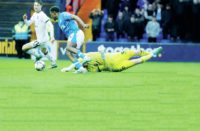MOST people think it was Sam Allardyce who inspired Phil Brown to take his first steps into coaching.
Yet while the West Ham boss would become both friend and mentor, it was Bruce Rioch, Brown's manager at Bolton, who sowed the first seeds.
“In one of his first games a player stood up to Bruce at half-time and questioned his tactics,” recalled Brown.
“Bruce just said: ‘Have you got your badges? Have you ever studied coaching or management?' The player said: ‘No, why?' and the reply came: ‘Sit down, shut up and listen to me tell you why I've decided you're coming off.' I decided to start my coaching badges the next day.”
That was 1992, and Brown knew he was nearing the end of a career that had begun at basement boys Hartlepool in the summer of 1978. A hard-working and dependable full-back for Pool, Halifax and then Bolton, Brown's quiet class and irrepressible will to win ensured he was a fan favourite at every turn.
“Phil is a winner and wants to be the best,” said Owen Coyle, a close friend during their two years together at Bolton.
“He would always come out fighting.
“I remember we had a head tennis court in the hallway at Burnden Park and me and John McGinley used to be top seeds.
“We used to beat Phil and Alan Thompson all the time and he got so sick of us winning that he actually wrote a letter to Man United inviting Eric Cantona and Ryan Giggs play us. He wanted to see us beaten that much!”
What Brown also had was a brassy and ebullient personality – a trait recognised by Allardyce who, after inheriting him at Blackpool in 1994, almost immediately asked him to be his assistant.
Sack
It was a tough decision for Brown, as an assistant's salary was around a quarter of what he was earning as a player. But, aided by his wife who took on a second job, the then 35-year-old accepted and a few years later was at Allardyce's side as Bolton reached the Premier League.
Though Brown eventually left to strike out on his own with Derby – an ill-fated seven-month stay that ended in the sack – Allardyce has fond memories of his protégé.
“Phil is the opposite to me,” said Allardyce. “He is the eternal optimist and I'm a pessimist. I'm always worried about not getting a result, what happens if this or that goes wrong. He's always confident of the win. You can't knock him down. He gets back up again and, if you knock him down again, he picks himself up once more. I admire him for that.”
But Allardyce also noticed a tendency that would cause problems for Brown when he re-emerged at Hull in 2006.
“'Sometimes Browny blew his top before I had a chance to speak,” he said. “He couldn't hold back his emotions and I'd let him go off and say what he thought. I'd take the softer approach once he had done that.”
That was fine while Hull were flying. And fly they did – from the foot of the Championship to the top of the Premiership in a fairytale first two years at the KC. But when the wheels came off in late 2009, Brown became the target. He was ridiculed for an incident at Man City when, with Hull 4-0 down at half-time, he performed an angry half-time team-talk on the pitch.
Later that year, players claimed he had ordered the canteen staff not to feed the players as punishment for poor performances. From being lauded as the model modern manager, Brown was suddenly painted as an egotist who bullied his players and antagonised the dressing room.
“The team was not behind Phil Brown,” said George Boateng, a Hull player at the time. “It was very difficult because some of the players feared him and some felt a lot under pressure.”
Brown was sacked in March 2010 with Hull heading for relegation. It is a reputation he has struggled to shrug off, a brief stint at Preston that ended in relegation from the Championship doing little to change perceptions.
Now at Southend, he admits that it may be a “last chance saloon”, but those who know him best feel it has been unfair.
“I feel very sorry for Phil,” said Dean Windass, his skipper at Hull. “He's the most successful manager Hull ever had . To take us into the top flight after 104 years was amazing.”
And Coyle says he is far from draconian. “I don't know if people see him like that because of the pressure you are under in this job,” he said.
“But Phil is great fun to be around, a very humorous guy. He is very witty and great company.”
PHIL BROWN FACT FILE
Born: South Shields, 1959 (Age 54)
Playing career: A right-back who made over 600 league appearances in an 18-year career, Brown started out at Hartlepool in 1978, playing 217 games before joining Halifax Town in 1985.
A big fan favourite at the Shay, his consistent performances yielded a move to Third Division Bolton in 1988. Twice beaten in the play-offs, Bolton finally won promotion to the second tier in 1992-93, although Brown moved on a year later – after 256 matches for the Trotters – to join Blackpool.
By then 34, he combined his playing duties with a stint as assistant to manager Sam Allardyce, retiring in 1996.
Managerial career: After Allardyce was sacked by Blackpool, Brown returned to Bolton as assistant to Colin Todd, ascending to the role of caretaker manager in 1999 and winning four out of five games.
Continued as assistant when Bolton appointed Allardyce and helped the Trotters win promotion to the Premier League. Left to become manager of Derby in 2005 but was sacked after winning just five of his 33 games.
Joined Hull as assistant to Phil Parkinson in 2006 and appointed manager with the club bottom of the table. Having first avoided relegation, Brown then won the Championship play-offs and led the Tigers into the Premier League in 2007-08, keeping them up the following year. However, he was sacked in March 2010 after a poor run of results and became manager of Preston in January 2011.
Left after failing to guide Preston to safety and a troubled start to life in League One then joined League Two Southend in March this year.















